I understand that the std::set is likely some sort of tree. I want to trigger std::set's worst-case insert(), contains(), and remove() operations - which I expect will take O(log(n)) time. I do not want to implement my own tree - I want to use std::set specifically.
In the image below, I perform these operations on std::set and the operations appear to be constant-time, on average. For bonus points, can anyone explain why this is constant instead of O(log(n))?

Below is my code measuring runtimes:
cout << "\n ................. Comparison: std::set vs. SortedQuickSet ..................\n ";
cout << "\n Operation | # Elements | Total SQSetSet Runtime | Total std::set Runtime";
cout << "\n ------------|------------|------------------------|-----------------------\n";
for (int i = 0; i < COMPARISON_SET_DOUBLINGS; i++)
{
set<unsigned> standardSet;
SortedQuickSet sortedQuickSet;
// Compare "Add" operations
time = clock(); // Start the timer
for (unsigned j = 0; j < pow(2, i) * COMPARISON_SET_INITIAL_SIZE; j++) standardSet.insert((RANDOMIZED_SET_SIZE)-(rand() % (RANDOMIZED_SET_SIZE)));
standardSetRuntime = clock() - time; // Stop the timer
time = clock(); // Start the timer
for (unsigned j = 0; j < pow(2, i) * COMPARISON_SET_INITIAL_SIZE; j++) sortedQuickSet.Add((RANDOMIZED_SET_SIZE)-(rand() % (RANDOMIZED_SET_SIZE)));
SortedQuickSetRuntime = clock() - time; // Stop the timer
cout << " Add |";
for (int j = 0; j < 18 - to_string(pow(2, i) * COMPARISON_SET_INITIAL_SIZE).length(); j++) cout << " ";
cout << pow(2, i) * COMPARISON_SET_INITIAL_SIZE << " |";
for (int j = 0; j < 23 - to_string(SortedQuickSetRuntime).length(); j++) cout << " ";
cout << SortedQuickSetRuntime << " | " << standardSetRuntime << " \n";
// Compare "Contains" operations
time = clock(); // Start the timer
for (unsigned j = 0; j < pow(2, i) * COMPARISON_SET_INITIAL_SIZE; j++) standardSet.find((RANDOMIZED_SET_SIZE)-(rand() % (RANDOMIZED_SET_SIZE)));
standardSetRuntime = clock() - time; // Stop the timer
time = clock(); // Start the timer
for (unsigned j = 0; j < pow(2, i) * COMPARISON_SET_INITIAL_SIZE; j++) sortedQuickSet.Contains((RANDOMIZED_SET_SIZE)-(rand() % (RANDOMIZED_SET_SIZE)));
SortedQuickSetRuntime = clock() - time; // Stop the timer
cout << " Contains |";
for (int j = 0; j < 18 - to_string(pow(2, i) * COMPARISON_SET_INITIAL_SIZE).length(); j++) cout << " ";
cout << pow(2, i) * COMPARISON_SET_INITIAL_SIZE << " |";
for (int j = 0; j < 23 - to_string(SortedQuickSetRuntime).length(); j++) cout << " ";
cout << SortedQuickSetRuntime << " | " << standardSetRuntime << " \n";
//// Compare "Get Sorted" operations
//standardSetRuntime = 0;
//time = clock(); // Start the timer
//for (auto element : standardSet) { }
//standardSetRuntime = clock() - time; // Stop the timer
//SortedQuickSetRuntime = 0;
//time = clock(); // Start the timer
//for (auto element : sortedQuickSet.Elements()) { }
//SortedQuickSetRuntime = clock() - time; // Stop the timer
//cout << " Get Sorted |";
//for (int j = 0; j < 18 - to_string(pow(2, i) * COMPARISON_SET_INITIAL_SIZE).length(); j++) cout << " ";
//cout << pow(2, i) * COMPARISON_SET_INITIAL_SIZE << " |";
//for (int j = 0; j < 23 - to_string(SortedQuickSetRuntime).length(); j++) cout << " ";
//cout << SortedQuickSetRuntime << " | " << standardSetRuntime << " \n";
// Compare "Remove" operations
time = clock(); // Start the timer
for (unsigned j = 0; j < pow(2, i) * COMPARISON_SET_INITIAL_SIZE; j++) standardSet.erase((RANDOMIZED_SET_SIZE)-(rand() % (RANDOMIZED_SET_SIZE)));
standardSetRuntime = clock() - time; // Stop the timer
time = clock(); // Start the timer
for (unsigned j = 0; j < pow(2, i) * COMPARISON_SET_INITIAL_SIZE; j++) sortedQuickSet.Remove((RANDOMIZED_SET_SIZE)-(rand() % (RANDOMIZED_SET_SIZE)));
SortedQuickSetRuntime = clock() - time; // Stop the timer
cout << " Remove |";
for (int j = 0; j < 18 - to_string(pow(2, i) * COMPARISON_SET_INITIAL_SIZE).length(); j++) cout << " ";
cout << pow(2, i) * COMPARISON_SET_INITIAL_SIZE << " |";
for (int j = 0; j < 23 - to_string(SortedQuickSetRuntime).length(); j++) cout << " ";
cout << SortedQuickSetRuntime << " | " << standardSetRuntime;
cout << "\n ------------|------------|------------------------|-----------------------\n";
}
cout << "\n Conclusion: on average, operations on a SortedQuickSet take ~30% as long as\n those on an std::set.";
cout << " Both set types perform these operations in constant\n time, and SortedQuickSet appears to have less overhead.\n";
cout << "\n ''''''''''''''''''''''''''''''''''''''''''''''''''''''''''''''''''''''''''''\n\n ";
